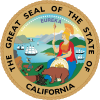California Senate Bill 531 (2019)
| California Senate Bill 531 (2019) | |
|---|---|
 | |
| California State Legislature | |
| Introduced | February 21, 2019 |
| Assembly voted | September 5, 2019 (48-21) |
| Senate voted | May 16, 2019 (27-8) |
| Sponsor(s) | Steve Glazer, Robert Hertzberg |
| Governor | Gavin Newsom |
| Code | Government Code |
| Section | § 53084.5 |
| Bill | SB 531 |
| Associated bills | AB 485 (2019) |
| Website | Text |
Status: Not passed (Vetoed) | |
In the 2019-2020 regular session of the California State Legislature, SB 531 was introduced to ban local governments from providing sales tax kickbacks to e-commerce businesses for using that jurisdiction as the point of sale. The bill passed both houses of the legislature, but was vetoed by Governor Gavin Newsom.[1]
Background[edit]
The California State Board of Equalization generally requires that online sales be taxed according to a seller's location. Companies can consolidate all of their online sales into a single location, giving its local jurisdiction the benefit of all online sales taxes collected by the company statewide.[2] In order to redirect local tax revenues into their own treasuries, cities have created revenue-sharing incentives for companies to use their jurisdictions as the point of sale. The companies typically receive half of the city's sales tax revenue as a rebate, which is therefore lost from being spent on public services statewide. Examples of such arrangements include:[3][4]
- Ontario: QVC and Nike, Inc.
- Dinuba: Best Buy
- Fresno: Ulta Beauty
- Sacramento: Macy's
- Cupertino: Apple Inc.
- San Bruno: Walmart
References[edit]
- ^ Veto message
- ^ Allocating Local Sales Taxes: Issues and Options, Legislative Analyst's Office, 2007,
As noted earlier, in cases where companies have multiple operations in California, sales taxes are allocated to the place where the principal sales negotiation takes place. For some businesses, such as cement manufacturers, Internet or mail order franchises, or suppliers of large computer systems, the sales offices may be located with other operations of the business or may be located in a separate location. If a company that has multiple places of business decides to consolidate all of its sales into just one office, the local jurisdiction which has that consolidated office can benefit from all the statewide sales of the business
- ^ "Apple's 22-Year Tax Break Part of Billions in California Bounty". news.bloombergtax.com. April 24, 2019. Retrieved February 26, 2023.
- ^ "Big Tech's California Tax Deals Pit Have-Not Cities Versus Haves". news.bloombergtax.com. February 24, 2023. Retrieved February 26, 2023.
